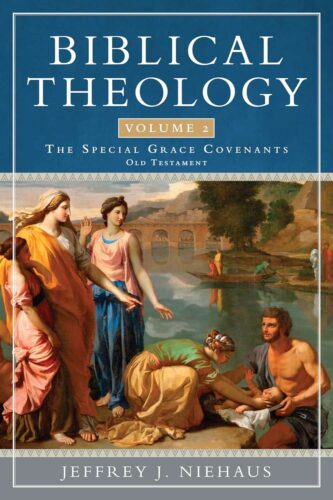 The Second in a Powerful, Covenantal Deep Dive
The Second in a Powerful, Covenantal Deep Dive
Author: Jeffery Niehaus
After many months I carefully and completely made my way through the second deep dive into Jeffery Niehaus’ Biblical Theology covenants series. The first book, Biblical Theology, Volume 1: The Common Grace Covenants, laid the groundwork for truly understanding covenants. These ancient covenants were more than just the modern-day promises we’ve equated them too. Instead, they were binding legal agreements, serious moments between kings and their subjects with historical connotations, stipulations, witnesses, blessings, curses, and conditional and unconditional elements. The first book in the series establishes the common covenants, which are still binding on the non-Christian world, as well as our understand of conventual nature and covenant renewals.
In this second treaty, we start to move towards the special grace covenants, which, due to their nature, are not universal, but instead specific covenants with specific groups of peoples. Specifically, Niehaus examines the Abrahamic and Mosaic covenants, briefly touching on the Davidic covenant as a prelude to the final book in the series, which will examine the fulfillment of these special grace covenants in the arrival of Jesus and His establishment of the final grace covenant that Christians continue to live within.
Niehaus applies and proves his covenant paradigm as he examines the Abrahamic, Mosaic, and Davidic covenants. This formula is namely:
- God works
- by His Spirit
- through the Incarnate Word
- to war against and defeat his foe(s)
- God establishes a covenant with a people
- God’s covenant establishes that people as God’s people
- God establishes a temple among His people, because He will reside among them.
Through this paradigm, Niehaus compares and contrasts the common grace covenants of the first volume with the special grace covenants, and then shows the differentiation between each special grace covenant and how they, one after the other, are predecessors to the Messiah and the final covenant. At roughly 450 in-depth, intense, and small print pages, Neihaus examines every aspect of the covenants, from the Holy Spirit’s work in (but not indwelling of) the Old Testament figures that mediated and lived under the covenant, the covenant blessings and curses, and the dual nature where these covenants are both conditional (they must be followed) and unconditional (despite our inevitable breaking of the covenant, God keeps His promise, delivering salvation through Jesus. Neihaus explains what it means for a person to fall away from the covenant while also explaining that a chosen people never could fall away, drawing out the meanings of grace and the unconditional/conditional nature of these Old Testament covenants and what they ultimately foreshadowed.
Niehaus also spends a lot of time with the main covenant mediators – Abraham and Moses – and a tiny amount of time with David. He looks at how each personage interacted with and kept or broke their own covenants, what restoration and renewal meant, how prophecy and Christology are central to each covenant, and the ultimate promise and inevitable failure of the Mosaic covenant.
As with the first volume, this is no light reading, and Niehaus loves his $20 dollar words and scholarly pomposity (seriously, why does every other word need to be “adumbrate,” and what on earth does this mean). Yet, despite the difficulty of the reading (you’ll need to be sharp, awake, and in a mood for note-taking and re-reading), there is a lot of rich material here. Neihaus’ examination helps us see the true nature of God’s covenantal relationship with us, the greatness and awe inherent in God giving such a covenant and continuing it, and His promises despite humanity’s continual breaking of the most basic of covenant requirements.
The preface of Christ in all these covenants and Neihaus’ look at the deliberate inadequacy of the Mosaic covenant helps readers further understand the sacrifice and pure awe-inspiring nature of that final covenant between Christians and Christ, and how all these covenants are merely prefaces, steppingstones in building toward that moment, showcasing the need for that final, unconditional relationship. Despite the scholarly twang, Neihaus has done an excellent job simplifying the mysterious and complex, helping readers to understand why covenantal language underpins the entire history of our faith and the preparation of the Old Testament world for a dramatic transition with Christ. Neihaus excurses are, as with the first volume, not to be missed, but pivotal in getting to the heart of the text and the key figures in the Old Testament who, even today, help shed light on God’s continued love and relationship with humankind.
I’m excited to move onto the final book in the series, the dramatic conclusion we’ve been working towards, where it all comes together in the figure of Jesus, that final special grace covenant that continues to sustain us today and promise eternal life, grace, and salvation. Highly recommended.
– Frances Carden
Follow my reviews on Twitter at: https://twitter.com/xombie_mistress
Follow my reviews on Facebook at: https://www.facebook.com/FrancesReviews
- Book Vs Movie: The Shining - April 6, 2020
- Thankful For Great Cozy Mysteries - December 13, 2019
- Cozy Mysteries for a Perfect Fall - October 20, 2019



